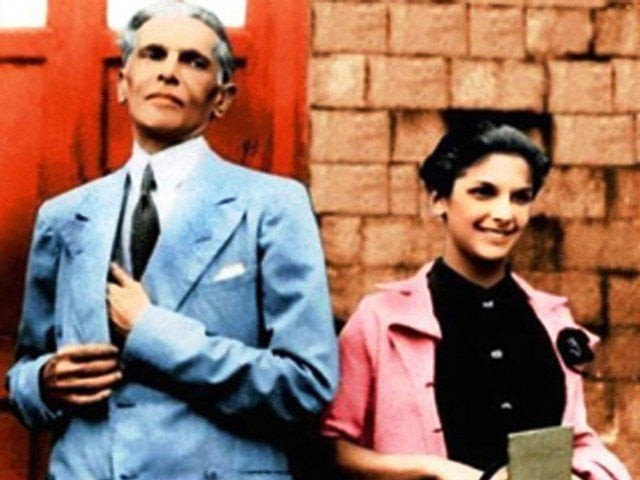Her father’s daughter
Dina may have commanded great respect across Pakistan but her life failed to resonate with many Pakistanis

PHOTO: DR. GHULAM NABI KAZI
The product of a difficult union, Dina was peculiarly denied paternal affection. For long, she remained bereft of a name till she selected one for herself – Dina – after her grandmother. Ruttie was curiously impervious towards the child. Jinnah always played indulgent father but his pressing engagements ensured Dina remained confined to the “margins of his life”. The only time both father and daughter appear to have enjoyed some semblance of intimacy was when Jinnah relocated to Hampstead. Fatima [Jinnah], the niece not liked. Familial care, in Dina’s formative years seems to have only come from her maternal grandmother – this, she remained always grateful for.
Remembering Dina
When a defiant Dina elected to marry Neville Wadia (a Parsi convert to Christianity), the father and daughter experienced a fallout. The nature of their ensuing relationship is subject to much speculation. In his book, Wolpert claimed Jinnah never spoke to his daughter after her marriage.
Khawaja Razi Haider’s Ruttie Jinnah: The Story, Told and Untold suggests otherwise. Selected letters of Dina to her father, penned over 1947 on the other hand, only make for endearing reading. In one, written on April 28, she congratulates her “darling papa” for them having “got Pakistan”. Another, addressed in June, reads like “fan mail”. It concludes with “…love and kisses and a big hug. Dina.”
That she remained in India [before relocating to New York] can be stated with certitude. That Dina only fleetingly visited Pakistan twice stands well-documented too. That Jinnah’s direct descendants lead enviable lives epitomising genteel Bombay society is also common knowledge.
Neville told Wolpert in 1982 that he had seen “very little” of his father-in-law on account of Jinnah’s opposition to his marriage. His daughter, he wrote, was “too young’’ and had seen 'little' of her grandfather.
Nusli Wadia, Dina and Neville’s son, is said to sympathise with “Hindutva harbingers”. Noted Bharatiya Janata Party [BJP] stalwarts he counts among friends. His association with former Indian deputy prime minister LK Advani spans decades.
Dragged – unceremoniously Nusli was – into the controversy that gripped India following the publication of Jaswant Singh’s Jinnah: India-Partition-Independence. In the clamour involving the industrialist’s “close friends”, Nusli was alleged to have bankrolled the book – a charge he vehemently denied. Separately, his memories of Jinnah are also not too vivid – the tycoon was barely a few years old at the time of his grandfather’s passing.
As news of Dina’s demise broke, condolences from Pakistani politicians, notables and the general public were quick to pour in. Great attention was devoted to her life – real and imagined – over the following days. More ink was spilled on her death than in her life on this side of the border.
Quaid-i-Azam’s daughter Dina Wadia passes away at 98 in New York
With the exception of being Jinnah’s daughter and staking claim to South Court – Jinnah’s (now derelict) palatial Bombay abode, what the famously private lady had to do with Pakistan is anybody’s guess. For long, the fate of the prized residence remained mired in a largely-tripartite tussle. Dina claimed ‘Jinnah House’ as her father’s sole heir. Pakistan covets South Court for reasons self-explanatory. The Government of India has classified the bungalow as “evacuee property”. A BJP Maharashtra MLA wants the house razed.
The deceased is as relevant to the nation as the female lead in a hero-centric Bollywood film. Pakistanis mourning Dina is akin to Iranians shedding tears over Leila Pahlavi or Varun Gandhi being felicitated in connection with Jawaharlal Nehru’s triumphs. But then, we have always excelled at appropriating the dead and/or famous. Overstating her pertinence to the nation is a disservice to history. Mrs Wadia had precious little to do with Pakistan.
Dina may have commanded great respect across the country her father single-handedly created. But, her life and times – born to a Muslim-Parsi couple, reared in cosmopolitan Bombay, marriage to a Christian and an aversion for the limelight – would fail to resonate with many a Pakistani. Death, it seems, pre-empted this by reducing Dina to the devoid-of-nuance ‘her father’s daughter’.



















COMMENTS
Comments are moderated and generally will be posted if they are on-topic and not abusive.
For more information, please see our Comments FAQ